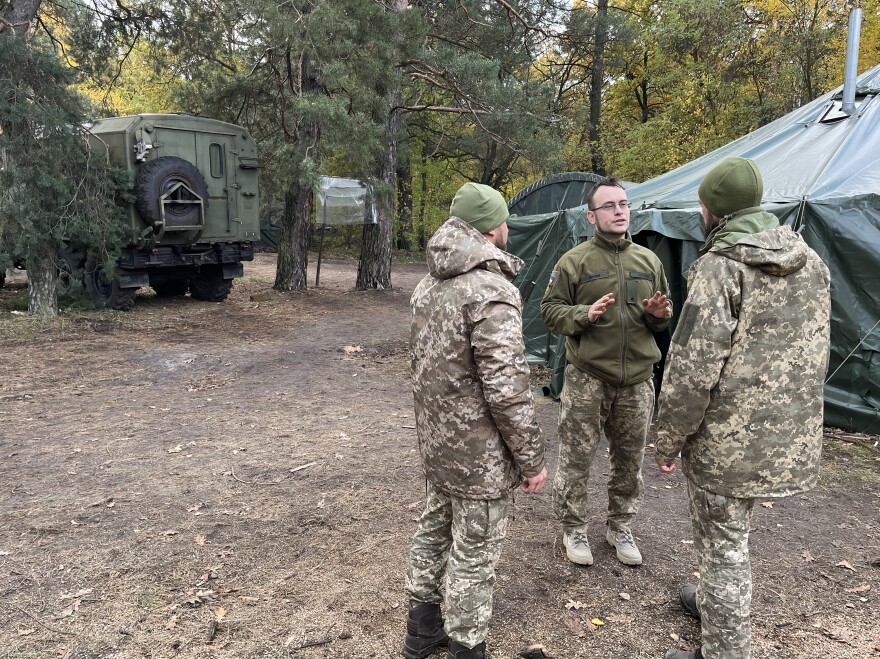DNIPRO, Ukraine — Lt. Anton Pendukh says the trauma he experiences on the front lines of the war against Russia is much different than how he pictured military life before joining the Ukrainian forces.
It's not that he didn't know previously that lives were lost and sacrifices made. But it's much different, he says, when you're living it — and the losses include the friends you've come to rely on and who rely on you.
"When I see it with my own eyes," he says, "it injures my soul. I understand that this happens, but when I see it..."
He pauses, looks down and then takes a deep breath.
"We will not be the same, never," he says. "Never."
Ukrainian forces are physically and emotionally exhausted after nine months of war.
Commanders say their forces' motivation and spirit are the most important weapons in the fight to protect their homeland. But they're not immune from the physical and mental costs that have weighed down so many soldiers in battle.
Many of the Ukrainian forces have not been home in months — some not since the war began in February.
Pendukh, 33, is at a training camp in eastern Ukraine, after serving several months on the front lines. His battalion is expanding and they're training some new members — some of whom have never picked up a gun before.
Like many soldiers, Pendukh is highly motivated. His purpose is clear: to liberate his homeland from Russian occupiers. But the war has taken a toll on him.

Still, he considers himself lucky. Friends in his battalion have served with squads that lost more than half their members.
"Lots of problems, even psychological problems," he says. "Some people from those formations, they need psychological help after this. Very serious psychological help."
Pendukh works on communications and logistics for the battalion. He's also an official "morale officer," with special training to spot signs of emotional distress and to talk colleagues through expected challenges.
Ukrainian commanders are turning to morale officers and psychologists to help keep up soldiers' spirits.
Lt. Anton Zolotaryov, a morale officer along with Pendukh for the battalion training at this camp in eastern Ukraine, works to prepare soldiers for the mental hardships of a long battle.
They watch over the soldiers, keeping them focused on the fight, addressing any problems quickly and not letting them fester inside, which can be dangerous on the battlefield. Zolotaryov says leaders and soldiers with low morale "can be poisonous."
Low morale is contagious, explains Ludmila Volter, a psychologist with Soldiers Shelter, an aid group in Zaporizhzhia.
Commanders have been calling on her more to counsel soldiers on the front lines as the war has dragged on, she says. She estimates she has traveled across the front lines to meet with more than 100 soldiers since the war began. Some one-on-one. And many in groups.
Younger soldiers have fewer reservations than older fighters about speaking with mental health professionals, she says. They're more open. They share details about panic attacks and even personal matters related to their families struggling without them back home.
But the biggest challenge Volter sees is survivor's guilt.
"It's when your brother dies and the soldier starts to condemn himself," she says. " 'I was in the wrong place. I should have been there.' "
It can limit their will to keep fighting, she says.
She says she tries to calm the soldiers down, explain they can only do so much and remind them of how important they are in the fight.

Maj. Roman Kovalev, who heads the battalion training on the military camp, says his soldiers' spirit and motivation are as critical to success as the U.S.-provided HIMARS, the long-range rocket launchers that have helped shift the war to Ukraine's favor.
And he understands all too well that his troops face challenges — he faces them too, he says.
To keep them motivated, Kovalev tells his soldiers what he tells himself during tough moments.
"I'm telling them two things when it's really hard and you're really tired," he says, "and that is to ask yourself: why are you here and for what reason?"
To Pendukh, the answer is his family.
He's tired of living out of a tent. He's tired of facing daily artillery fire. He misses his mom and her cooking.
He acknowledges crying while eating an apple pie that his mother recently sent him.
But he says it's even harder for his loved ones.
"The further you are from the action, the more scary it feels," he says.
One attack hit his own home — the Kyiv apartment he shared with his girlfriend.
"She told me how she survived that attack. She helped the injured in those attacks," he says.
He's thankful she wasn't there at the time. But now he doesn't have a home to return to.
"So I'm getting angry," he says. "I'm getting more angry every day."
He insists that fighting for Ukraine, fighting for his loved ones, helps him deal with his own challenges. The attacks on his country drive him.
And that's why he says he needs to be on the front lines. For him, at least, it's therapeutic.
Copyright 2023 NPR. To see more, visit https://www.npr.org.



